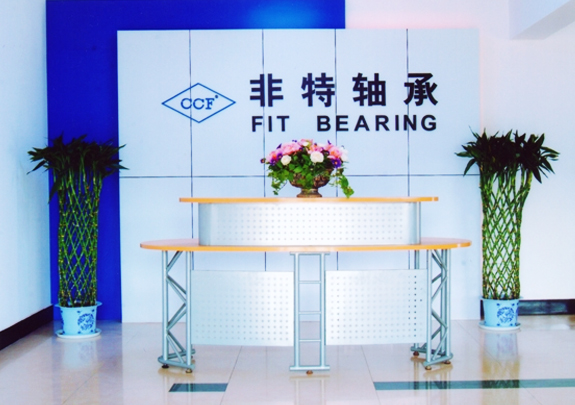Cotton picker Bearings
VIEW DETAILS
VIEW DETAILS

Zhejiang Fit Bearing Co., Ltd. was established in November 2003 with a registered capital of USD 2 million. The plant covers an area of 35,000 square meters and 20,000 square meters, with more than 120 workers and more than 20 technical management personnel.
At the beginning of its establishment, the company specialized in producing all kinds of low-noise long-life ball bearings. As a professional China Cotton picker Bearings Manufacturers and Cotton picker Bearings Suppliers, After years of development in the bearing industry, we have accumulated rich experience in production and management. In 2013, we began to vigorously develop agricultural machinery parts and construction machinery parts. At present, we have formed a team with exquisite technology and excellent management, capable of R&D, manufacturing, sales and service in the bearing industry and agricultural machinery parts. After years of hard work and development, we have formed a capable R&D and manufacturing team. They have rich knowledge and experience in materials, heat treatment, machining and grinding. There are currently 9 professional R&D engineers responsible for the development of new products.
The main shaft bearing is the most important component in the engine. If the main shaft bearing fails, it will directly cause the engine to stop running. In order to improve the reliability of the eng...
Read MoreBearing failure is a common problem during the operation of bearings, and the form of wear is a type of bearing failure. Wear can also cause significant damage to bearings, and repairing a few pieces ...
Read MoreThe working temperature of cylindrical roller bearings depends on various factors, including the heat output of all relevant heat sources, the heat flow rate between heat sources, and the heat dissipa...
Read MoreHow do different bearing types affect the performance of a cotton picker?
Different bearing types can significantly impact the performance of a cotton picker. The choice of bearing type is crucial because it influences various aspects, including efficiency, reliability, maintenance requirements, and overall machine performance.
Ball Bearings:
Advantages:Low friction, providing smooth operation.Suitable for high-speed applications.Generally lower cost compared to some other types.
Impact on Cotton Picker Performance:Improved efficiency due to low friction, contributing to energy savings.Suitable for applications with rotational motion, such as wheels and pulleys.Smoother operation at high speeds, which is essential for certain aspects of cotton picking.
Roller Bearings:
Advantages:Higher load-carrying capacity compared to ball bearings.Better performance under heavy radial loads.Greater rigidity and stability.
Impact on Cotton Picker Performance:Enhanced load-carrying capacity, making roller bearings suitable for heavy-duty applications.
Improved stability under varying field conditions, contributing to overall machine reliability.Potential for longer service life in challenging environments.
Needle Bearings:
Advantages:High load-carrying capacity in a compact design.
Suitable for applications with limited radial space.Excellent performance in oscillating motion.
Impact on Cotton Picker Performance:Compact design allows for more flexibility in machine design.Well-suited for components with oscillating or reciprocating motion.Effective in situations where space is constrained, contributing to a more versatile cotton picker design.
Thrust Bearings:
Advantages:Designed to handle axial loads.Can accommodate high thrust loads in one direction.
Impact on Cotton Picker Performance:Useful in components where axial loads are prevalent, such as in the transmission system.Ensures proper handling of forces, contributing to the longevity of critical components.
What factors determine the load capacity of bearings in a cotton picker?
The load capacity of bearings in a cotton picker is determined by several factors that take into account the operational conditions and demands of the machinery. Cotton pickers are agricultural machines designed to harvest cotton efficiently, and the bearings used in these machines must be able to withstand the loads and stresses associated with the application.
Operational Loads:
The primary factor influencing the load capacity is the type and magnitude of the loads the bearings will experience during operation. Cotton pickers undergo various types of loads, including radial loads (resulting from the weight of the components and harvested cotton), axial loads (caused by the motion of the machine), and moment loads (due to the twisting or bending forces).
Harvesting Conditions:
The load capacity of bearings needs to consider the specific harvesting conditions, including the density of the cotton crop, the terrain, and the speed of the cotton picker. Harvesting in dense or wet cotton fields may subject the bearings to higher loads, impacting their load-carrying capacity.
Speed of Operation:
The rotational speed of the various components, such as spindles or rollers, influences the load capacity requirements. Higher speeds can generate additional heat and affect the lubrication and thermal characteristics of the bearings.
Dynamic and Static Loads:
Bearings must be rated for both dynamic loads (those experienced during rotation and movement) and static loads (those present when the machine is stationary). Dynamic loads are typically higher and must be considered for proper bearing selection.
Shock and Impact Loads:
Cotton pickers may encounter shock and impact loads during operation, especially in uneven terrain or when encountering obstacles. Bearings must be capable of handling sudden loads without experiencing premature failure.